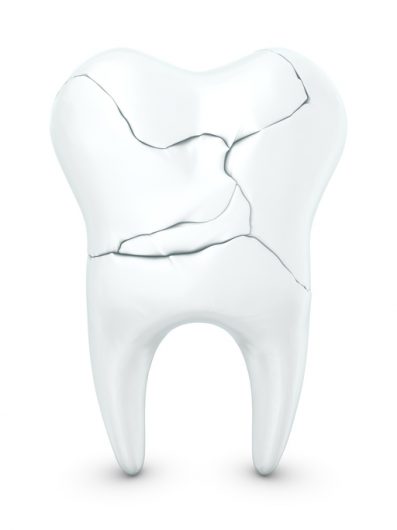Your teeth work hard for you every day! It’s difficult to imagine life without them. And when you get a cracked tooth, it becomes so much more apparent that your teeth are an essential part of your everyday life. Suddenly you can’t eat your favorite foods without worrying that you’ll worsen the crack, and you might even experience pain and sensitivity when drinking hot or cold beverages.What will be clear as daylight, is that you can’t live with the crack forever.
How Do Teeth Crack?
Even though it doesn’t always seem that way, your teeth are one of the strongest parts of your whole body. In fact, the outer most layer of tissue covering your teeth (called enamel) is the hardest, strongest tissue in your whole body. This is understandable, seeing as your teeth have to withstand the pressure of chewing all kinds of foods, including ones that are a bit crunchy and hard.
But although your teeth are strong, they’re far from being indestructible. The main thing you can do to prevent tooth cracks is to take good care of you teeth. Brush and floss regularly and avoid eating too much sugar. Consuming large amounts of sugar on a daily basis is one of the primary reasons for more rapid tooth decay in our modern society. Although brushing helps this issue tremendously, cutting back on fizzy drinks, candy and other sweet foods is one of the best lifestyle changes you can make for your dental health.

The main thing you can do to prevent tooth cracks is to take good care of your teeth. Brush and floss regularly and avoid eating too much sugar.
But even if you do everything just right, your teeth can still crack. When a tooth cracks, there’s usually a good reason.
Some things that can cause your teeth to crack include:
- Poor dental hygiene (this leads to decay)
- Biting on hard things
- Falling face first into a hard surface
- Tooth decay (this weakens your tooth and makes it structurally weaker)
The good thing about this, is that practicing proper dental hygiene is more efficient in preventing tooth damage than most people realize. So your dental health is still largely within your control.
Do Some People Have Naturally Weaker Teeth?
Not everyone if this world gets their share of tooth damage. While some people are often in and out of dental offices from a young age, others can go through their whole childhood and longer without getting a cracked tooth, or even so much as a small dental filling. This leads many people to wonder if some people just have better teeth than others.
The truth isn’t surprising. Because yes – even dentists can’t deny that some people have better teeth. However, the reason for this isn’t obvious. In a perfect world, researchers would be able to 100% isolate potential causes for weaker teeth, such as genetic factors, dental hygiene as well as diet and nutrition.
 But the world doesn’t have to be perfect for researchers to gather information that helps to solve the riddle. Research suggests that nutrition during early childhood plays a big role in helping children develop strong, healthy teeth. Key nutrients that help children develop strong teeth include vitamin A, C, D and B. Vitamin C, for instance, is a vital nutrient for absorbing calcium, which in turn is an important mineral nutrient for strong bones and teeth. The research also suggests that malnutrition can cause tooth problems.
But the world doesn’t have to be perfect for researchers to gather information that helps to solve the riddle. Research suggests that nutrition during early childhood plays a big role in helping children develop strong, healthy teeth. Key nutrients that help children develop strong teeth include vitamin A, C, D and B. Vitamin C, for instance, is a vital nutrient for absorbing calcium, which in turn is an important mineral nutrient for strong bones and teeth. The research also suggests that malnutrition can cause tooth problems.
While most children in American households should have access to healthy foods that prevent malnutrition, the burden that faces US children is less about availability of healthy foods, and more about dietary choices. It can only be assumed that kids living on diets that consist of a lot of sugars and processed foods are likely to have weaker teeth when they grow up. What this means is that a good diet for a growing child can go a long way in helping their long-term health and preventing cracked teeth!
Guidelines on Fixing A Cracked Tooth
Prevention is definitely better than cure, but if your tooth is already cracked, you’ll need to fix it. There’s no way you should live with pain and discomfort!
The only way to fix your cracked tooth is to make an appointment with your dentist. Depending on the damage, your dentist can fix your tooth using dental inlays and onlays, or a crown. In some cases other treatment alternatives may be required.
While you wait for your dental appointment, feel free to take over-the-counter pain relievers . Also be sure to keep your mouth perfectly clean to avoid infections, you can do this by rinsing your mouth with salty water or an anti-bacterial mouthwash. Place cotton, gauze or a piece of sugarless gum over sharp edges on your cracked tooth to avoid cuts inside your mouth. Take good care of yourself!



